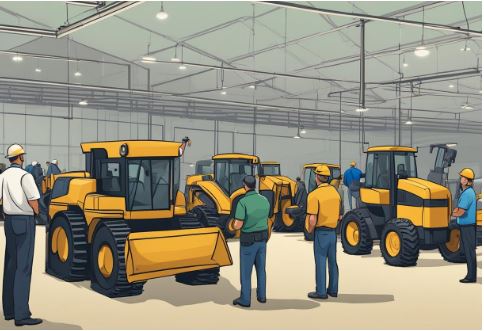Industrial auctions are a popular way for businesses to acquire used machinery and equipment. These auctions are typically held when a company goes out of business, moves locations, or needs to liquidate assets for other reasons. The items up for auction can range from small tools to large industrial machinery, making it an attractive option for businesses of all sizes.
Attending an industrial auction can be a great way to save money on equipment and machinery. Buyers can often find high-quality items at a fraction of the cost of buying new. However, it is important to do your research and understand the risks involved. Items sold at auction are typically sold as-is, meaning there is no guarantee of their condition or functionality. Additionally, bidding can be competitive and it is important to set a budget beforehand to avoid overspending.
Understanding Industrial Auctions
Industrial auctions are an important aspect of the global economy, allowing companies to buy and sell used equipment, machinery, and other assets. These auctions are typically held by auction houses or online platforms and are open to both individuals and businesses looking to purchase industrial equipment.
Types of Industrial Auctions
There are several types of industrial auctions, including live auctions, online auctions, sealed bid auctions, and hybrid auctions. Live auctions are held in person, while online auctions are conducted over the internet. Sealed bid auctions allow bidders to submit their bids in a sealed envelope, and the highest bidder wins. Hybrid auctions combine elements of both live and online auctions.
Benefits of Industrial Auctions
Industrial auctions provide several benefits for both buyers and sellers. For buyers, auctions offer the opportunity to purchase equipment and machinery at a lower cost than buying new. Additionally, auctions provide access to a wide range of equipment and machinery from various industries.
For sellers, auctions offer a quick and efficient way to dispose of surplus equipment and machinery. This helps to free up space and generate revenue for the company. Additionally, auctions provide a competitive bidding environment, which often results in higher prices for the seller.
Key Players in Industrial Auctions
There are several key players in the industrial auction industry, including auction houses, online platforms, and equipment dealers. Auction houses such as Ritchie Bros. Auctioneers and IronPlanet specialize in conducting live and online auctions for industrial equipment and machinery. Online platforms such as Proxibid and BidSpotter provide a marketplace for buyers and sellers to connect and conduct transactions.
Equipment dealers such as Caterpillar and John Deere also play a role in the industrial auction industry. These dealers often sell used equipment through auctions or directly to buyers. Overall, the industrial auction industry is a dynamic and important part of the global economy, providing opportunities for buyers and sellers to conduct business efficiently and effectively.
Preparing for an Industrial Auction
When preparing for an industrial auction, there are several key considerations that must be taken into account. These include inventory assessment, valuation of assets, and legal considerations.
Inventory Assessment
Before an auction can take place, it is important to conduct a thorough assessment of the inventory that will be included in the sale. This includes identifying all of the assets that will be sold, as well as their condition and any necessary repairs that may need to be made. It is also important to determine the market demand for these assets, as this will help to inform pricing decisions.
Valuation of Assets
Once the inventory has been assessed, it is important to determine the value of the assets that will be included in the auction. This can be done through a variety of methods, including appraisals, market research, and consultations with industry experts. It is important to ensure that the valuation is accurate and reflective of the true value of the assets, as this will help to attract potential buyers and ensure that the auction is successful.
Legal Considerations
Finally, it is important to consider the legal implications of the auction. This includes ensuring that all necessary permits and licenses are obtained, as well as complying with any relevant regulations and laws. It is also important to ensure that all contracts and agreements are in place, and that all parties involved understand their rights and responsibilities.
Overall, preparing for an industrial auction requires careful planning and consideration of a variety of factors. By taking the time to assess inventory, value assets, and consider legal implications, auction organizers can ensure that their event is successful and profitable.
Participating in Industrial Auctions
Industrial auctions are a great way to acquire machinery, equipment, and other industrial assets at a discounted price. However, participating in an industrial auction can be a daunting task, especially for first-time buyers. In this section, we will discuss the registration process, bidding strategies, and payment and shipping options for industrial auctions.
Registration Process
Before participating in an industrial auction, buyers must register with the auctioneer. The registration process typically requires buyers to provide personal information, such as name, address, and contact information. Buyers may also be required to provide proof of identity and financial information, such as a credit card or bank account information.
Bidding Strategies
Bidding in an industrial auction requires a strategic approach to ensure that buyers get the best deal possible. One strategy is to set a maximum bid amount and stick to it. Buyers should also research the value of the item they are interested in and set their bid accordingly. Another strategy is to bid early and often, as this can help to establish dominance in the bidding process and discourage other buyers from bidding against you.

